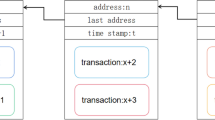Abstract
Byzantine agreement has always been an important research topic of distributed computing and has been widely applied to blockchain technology in recent years. We propose a quantum protocol for solving multi-valued detectable Byzantine agreement problem in this paper. Each general is firstly distributed a list that no one else knows based on d-dimensional entangled states. Then the n generals can reach an agreement in which t (where t < n/3) of them are disloyal by using these lists. Finally, it is proved that the list distribution process is secure, and the proposed protocol satisfies the definition of the multi-valued detectable Byzantine agreement.
Similar content being viewed by others
References
Pease, M., Shostak, R., Lamport, L.: Reaching agreement in the presence of faults. J. ACM (JACM) 27(2), 228–234 (1980)
Lamport, L., Shostak, R., Pease, M.: The Byzantine generals problem. ACM Trans. Program. Lang. Syst. (TOPLAS) 4(3), 382–401 (1982)
Vukolic, M.: The Quest for Scalable Blockchain Fabric: Proof-of-work vs. BFT Replication. International Workshop on Open Problems in Network Security, pp. 112–125. Springer, Berlin (2015)
Cachin, C.: Architecture of the hyperledger blockchainfabric workshop on distributed cryp-tocurrencies and consensus ledgers (2016)
Androulaki, E., Barger, A., Bortnikov, V., et al.: Hyperledger fabric: a distributed operating system for permissioned blockchains. In: EuroSys’ 18: Thirteenth EuroSys Conference 2018, April 23–26, 2018, Porto, Portugal, p 15. ACM, New York (2018). https://doi.org/10.1145/3190508.3190538
Salah, K., Rehman, M.H., Nizamuddin, N., Al-Fuqaha, A.: Blockchain for AI: Review and open research challenges. IEEE Access. https://doi.org/10.1109/ACCESS.2018.2890507 (2019)
Fischer, M.J., Lynch, N.A., Merritt, M.: Easy impossibility proofs for distributed consensus problems. Distrib. Comput. 1(1), 26–39 (1986)
Fitzi, M., Garay, J.A., Maurer, U., Ostrovsky, R.: Minimal complete primitives for secure multi-party computation. In: Annual International Cryptology Conference Springer, Berlin, Heidelberg, 80–100 (2001)
Fitzi, M., Gisin, N., Maurer, U.: Quantum solution to the Byzantine agreement problem. Phys. Rev. Lett. 87(21), 217901 (2001)
Cabello, A.: N-particle N-level singlet states: some properties and applications. Phys. Rev. Lett. 89(10), 100402 (2002)
Cabello, A.: Supersinglets. J. Mod. Opt. 50(6-7), 1049–1061 (2003)
Cabello, A.: Solving the liar detection problem using the four-qubit singlet state. Phys. Rev. A 68(1), 012304 (2003)
Iblisdir, S., Gisin, N.: Byzantine agreement with two quantum-key-distribution setups. Phys. Rev. A 70(3), 034306 (2004)
Gaertner, S., Bourennane, M., Kurtsiefer, C., et al.: Experimental demonstration of a quantum protocol for Byzantine agreement and liar detection. Phys. Rev. Lett. 100(7), 070504 (2008)
Gao, F., Guo, F.Z., Wen, Q.Y., et al.: Comment on “Experimental demonstration of a quantum protocol for byzantine agreement and liar detection”. Phys. Rev. Lett. 101(20), 208901 (2008)
Bourennane, M., Cabello, A., Zukowski, M.: Quantum Byzantine agreement with a single qutrit. arXiv:1001.1947 (2010)
Rahaman, R., Wieśniak, M., Żukowski, M.: Quantum Byzantine agreement via Hardy correlations and entanglement swapping. Phys. Rev. A 92(4), 042302 (2015)
Yao, A.C.: Protocols for secure computations. In: Proceedings of 23rd IEEE Symposium on Foundations of Computer Science (FOCS’82), Washington, DC, USA, pp. 160–164 (1982)
Goldreich, O., Micali, S., Wigderson, A.: How to play ANY mental game. In: Proceedings of the Nineteenth Annual ACM Conference on Theory of Computing. NewYork, pp. 218229 (1987)
Yang, Y.G., Wen, Q.Y.: An efficient two-party quantum private comparison protocol with decoy photons and two-photon entanglement. J. Phys. A Math. Theor. 42(5), 055305 (2009)
Luo, Q.B., Yang, G.W., She, K., et al.: Quantum private comparison protocol with linear optics. Int. J. Theor. Phys. 55(12), 5336–5343 (2016)
Srikanth, T.K., Toueg, S.: Simulating authenticated broadcasts to derive simple fault-tolerant algorithms. Distrib. Comput. 2(2), 80–94 (1987)
Castro, M., Liskov, B.: Practical Byzantine fault tolerance. In: OSDI, vol. 99, pp. 173–186
Singh, A., Das, T., Maniatis, P., et al.: BFT protocols under fire. In: NSDI, vol. 8, pp. 189–204 (2008)
Sousa, J., Bessani, A., Vukolic, M.: A Byzantine fault-tolerant ordering service for the hyperledger fabric blockchain platform. In: 2018 48th Annual IEEE/IFIP International Conference on Dependable Systems and Networks (DSN), pp. 51–58 (2018)
Shor, P.W.: Polynomial-time algorithms for prime factorization and discrete logarithms on a quantum computer. SIAM Rev. 41(2), 303–332 (1999)
Grover, L.K.: A fast quantum mechanical algorithm for database search. In: Proceedings of the Twenty-Eighth Annual ACM Symposium on Theory of Computing, pp. 212–219 (1996)
Liu, X.S., Long, G.L., Tong, D.M., Li, F.: General scheme for super dense coding between multi-parties. Phys. Rev. A 65, 022304 (2002)
Luo, Q.B., Yang, G.W., She, K., et al.: Multi-party quantum private comparison protocol base on d-imensional entangle states. Quantum Inf. Process 13(10), 2343–2352 (2014)
Chang, Y., Tsai, C., Hwang, T.: Multi-user private comparison protocol using GHZ class states. Quantum Inf. Process 12(2), 1077–1088 (2013)
Gupta, M., Pathak, A., Srikanth, R., et al.: General circuits for indirecting and distributing measurement in quantum computation. International Journal of Quantum Information 5(04), 627–640 (2007)
Acknowledgements
This work is supported by the Science-Technology Project from Hubei Provincial Department of Education (Grant No. Q20181902).
Author information
Authors and Affiliations
Corresponding author
Additional information
Publisher’s Note
Springer Nature remains neutral with regard to jurisdictional claims in published maps and institutional affiliations.
Rights and permissions
About this article
Cite this article
Luo, Qb., Feng, Ky. & Zheng, Mh. Quantum Multi-valued Byzantine Agreement Based on d-dimensional Entangled States. Int J Theor Phys 58, 4025–4032 (2019). https://doi.org/10.1007/s10773-019-04269-3
Received:
Accepted:
Published:
Issue Date:
DOI: https://doi.org/10.1007/s10773-019-04269-3




